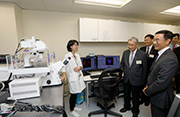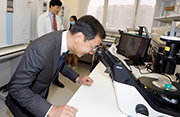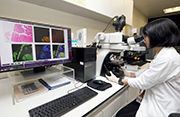

About HKJC
Jockey Club supports redevelopment of Cancer Research Laboratory at QEH
09/04/2018
Cancer is a leading cause of death in Hong Kong, according to statistics released by the Government. It accounts for more than 30% of all deaths in the city, and the number of cancer patients treated is on a rising trend. Cancer research, which aims to identify causes of the disease and develop strategies for its prevention, diagnosis and treatment, remains the most important initiative to fight the disease and improve patient care. As a means of strengthening and enhancing the city’s research and treatment capacity in this area, The Hong Kong Jockey Club Charities Trust has granted the Hospital Authority (HA) funding of some HK$54 million to redevelop the cancer research laboratory at Queen Elizabeth Hospital (QEH).
Today (4 September) marked the official opening of the redeveloped facility, which has been renamed the Jockey Club Cancer Research Laboratory. Club Steward Michael Lee joined the HA’s Chairman Professor John Leong and Chief Executive Dr Leung Pak-yin; QEH Governing Committee Chairman Dr Kam Pok-man and former Chairman John Lee; and Chief Executive of the Kowloon Central Cluster and QEH Dr Albert Lo in unveiling a commemorative plaque.
Mr Lee said the Club hoped that its support to the redevelopment of the Cancer Research Laboratory could help the healthcare profession increase the effectiveness of cancer diagnosis and treatment, benefiting more cancer patients. “The Club believes that ‘prevention is better than cure’ and that regular check-ups and early treatment are very important, especially in dealing with cancer,” he said. “Therefore the Club has been investing actively in cancer prevention and treatment, as well as co-operating with different organisations to enhance cancer-related services.”
Set up in the 1960s, the Laboratory is currently located on the 13th floor of the Jockey Club Institute of Radiotherapy and Oncology at QEH. Over the past half century, its researchers have accomplished a number of key discoveries, such as finding the strong association between eating Chinese salted fish and the development of nasopharyngeal cancer (NPC), as well as making use of Epstein-Barr virus detection for the diagnostics and prognostic prediction on NPC patients. Of particular note, the Laboratory has been studying some biomarkers associated with lung cancer and NPC. This may facilitate the development of diagnostics and prognostic prediction of lung cancer and NPC patients as well as anti-cancer therapeutic strategies which may be more effective than traditional treatments such as chemotherapy or radiotherapy and have less adverse effect on the normal cells.
Research staff at the Jockey Club Cancer Research Laboratory will now work closely with QEH oncologists in studying the development of common cancers in Hong Kong such as NPC, lung cancer and breast cancer, in addition to developing biomarkers of cancers that are prevalent among Asian and Chinese patients, but which are rare in western countries and have received less attention in overseas research studies. This will help bridge the gap of cancer research in the medical world and benefit a large number of cancer patients not only in Hong Kong, but also in Asia. Equipped with specialised cancer research equipment and advanced technologies, the Laboratory will become a centralised biobank for the collection and storage of tumour specimens collected from cancer patients, and a research and testing centre for pre-clinical drug trials. It will also facilitate collaboration on cancer research among different parties inside and outside the HA, so as to improve the effectiveness of cancer diagnosis and treatment.
The Club has long been a staunch supporter of Hong Kong’s medical and health development, having supported the construction of medical and health facilities citywide since the 1950s. It has also been a close partner of the HA over the years. Its support for HA facilities includes funding the establishment of the Jockey Club Institute of Radiotherapy and Oncology The Jockey Club Institute of Radiology and Imaging, and the Jockey Club Endovascular & Minimal Access Operation Centre at QEH,. In addition, the Club is supporting the University of Hong Kong in setting up the Centre for Clinical Innovation and Discovery and the Institute of Cancer Care.
The Hong Kong Jockey Club
Founded in 1884, The Hong Kong Jockey Club is a world-class racing club that acts continuously for the betterment of our society. The Club has a unique integrated business model, comprising racing and racecourse entertainment, a membership club, responsible sports wagering and lottery, and charity and community contribution. Through this model, the Club generates economic and social value for the community and supports the Government in combatting illegal gambling. In 2017/18, the Club made a record return to the Government of HK$22.6 billion in duty and profits tax and contributed HK$1.2 billion to the Lotteries Fund. Approved charity donations were HK$4.2 billion. The Club is Hong Kong's largest single taxpayer and one of the city’s major employers. Its Charities Trust is also one of the world's top ten charity donors. The Club is always "riding high together for a better future" with the people of Hong Kong.
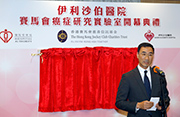
Picture 1:
Club Steward Michael Lee says the Club hopes that its support to the Jockey Club Cancer Research Laboratory can help the healthcare profession increase the effectiveness of cancer diagnosis and treatment, benefiting more cancer patients.
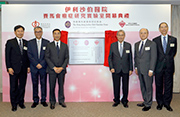
Picture 2:
Unveiling a commemorative plaque at the opening ceremony of the Jockey Club Cancer Research Laboratory are Club Steward Michael Lee (3rd left); the HA’s Chairman Professor John Leong (3rd right) and Chief Executive Dr Leung Pak-yin (1st left); QEH Governing Committee Chairman Dr Kam Pok-man (2nd left) and former Chairman John Lee (2nd right); and Chief Executive of the Kowloon Central Cluster and QEH Dr Albert Lo (1st right).
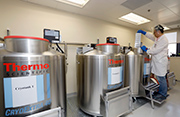
Picture 5:
Photos 5/6:
Equipped with specialised cancer research equipment and advanced technologies, the Jockey Club Cancer Research Laboratory will become a centralised biobank for the collection and storage of tumour specimens collected from cancer patients, and a research and testing centre for pre-clinical drug trials.

